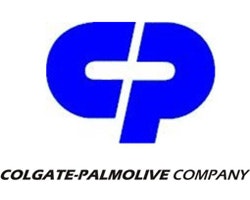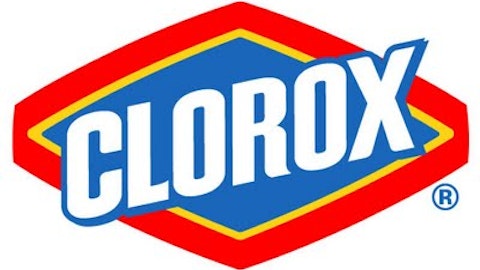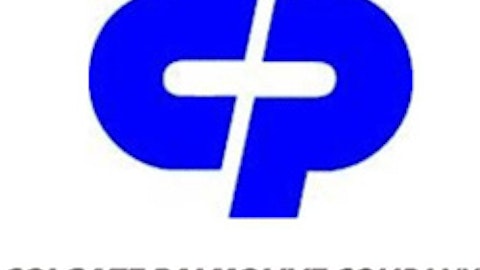Consumer products giant Colgate-Palmolive Company (NYSE:CL), the maker of Colgate toothpaste, Palmolive soap and Ajax household cleaners, recently disappointed Wall Street with weaker-than-expected growth in emerging markets. Since Colgate is a considered a conservative, low-beta, income stock, are analyst concerns overblown? Does the stock’s recent dip represent a unique buying opportunity? Let’s analyze Colgate’s sources of growth and decide if the stock is fairly valued.

Colgate generates 80% of its revenue from international markets. 50% of total revenue comes from emerging markets, while 29% comes from Latin America.
The company’s global revenue grew by 2%, thanks to a 3% gain in sales volume and a 3% increase in prices. This demonstrates pricing power – which companies like Colgate must possess to outpace local and generic competitors.
Global organic sales rose 6%, boosted mainly by 10% organic sales growth in emerging markets. All these strong numbers helped offset a 4% loss from unfavorable currency impacts in 2012.
The Business of Clean Teeth
Out of all of Colgate-Palmolive’s products, demand for its toothbrush and toothpaste products increased the most since the beginning of the year. Colgate’s share of the global toothpaste market increased to 44.6%, while its manual toothbrush market share rose to 32.7%.
Gaining market share in such a fragmented market is not easy, with so many cheaper toothpaste and toothbrush brands available globally.
Venezuela and Latin America
However, Colgate’s Achilles’ heel was its Latin American market, which posted a 1.5% slowdown in sales. Uncertainty prior to elections in Venezuela, exacerbated by a labor slowdown and inflation, dragged down operating income in the region by approximately 4%.
Venezuela devalued its currency for the fifth time in nine years, devaluing the currency by 32% to 6.3 bolivars per U.S. dollar, in an attempt to hold off inflation. With only 0.4% of the world’s population, Venezuela shouldn’t be a major flashpoint, but the country “ has a disproportionate share of sales of many consumer products companies,” according to BMO Capital Markets analyst Connie Maneaty. Colgate depends on Venezuela for 5.2% of its total global sales.
The Venezuelan government also controls prices for basic necessities such as toothpaste, diapers and bleach. In April, President Hugo Chavez set price caps on 19 consumer products in an effort to slow inflation.
While 5.2% of total sales isn’t a big deal for Colgate, Venezuela’s inflation is symptomatic of inflation in other major Latin American economies such as Brazil. If inflation across the region worsens, then Colgate’s bottom line will suffer greatly.
Analysts remain bullish
Colgate’s problems in Latin America spooked some myopic investors, who sold off the stock on February 8. However, most analysts believe the company’s long-term growth potential remains intact, and will strengthen into 2013.
S&P gave Colgate-Palmolive a vote of confidence, stating, “We believe Colgate-Palmolive will be able to maintain its strong market share and to continue investing in R&D and marketing, ultimately benefiting from rising incomes and changing lifestyles, especially in less mature overseas markets.”
Meanwhile, CNBC’s Jim Cramer also remained bullish on the stock, simply stating, “People didn’t like the quarter. I did. Buy, buy, buy.”
The Foolish Fundamentals
Let’s see how Colgate-Palmolive stacks up to two other big, multinational consumer products manufacturers – The Procter & Gamble Company (NYSE:PG) and The Clorox Company (NYSE:CLX).
Procter & Gamble recently disappointed investors with poor organic growth, caused by price hikes that drove consumers to buy cheaper generic brands. Meanwhile, Clorox posted strong second quarter earnings that easily topped forecasts.
Both Procter & Gamble and Clorox have been heavily pressured by activist investors for their perceived complacence and stagnation. William Ackman attempted to oust P&G’s CEO Robert McDonald, while Carl Icahn pushed Clorox to sell itself in 2011.
In contrast, Colgate’s major stakeholders have stayed calm and quiet. Perhaps this chart explains why Colgate-Palmolive shareholders are happier with their company.
All three companies have been using similar expansion tactics into emerging markets to even out its global bets. Clorox is also heavily exposed to Venezuela and the Latin American market, which has weighed on its stock recently.
| Forward P/E | 5-year PEG | Price to Sales (ttm) | Debt-to-Equity | Profit Margin | Return on Equity (ttm) | |
| Colgate-Palmolive | 16.67 | 1.82 | 3.04 | 218.83 | 14.47% | 106.71% |
| P&G | 17.26 | 2.30 | 2.50 | 49.65 | 15.50% | 17.51% |
| Clorox | 17.32 | 2.19 | 1.89 | 4,775.00 | 10.03% | N/A |
| Advantage | Colgate | Colgate | Clorox | P&G | P&G | Colgate |
Source: Yahoo Finance
Colgate has two key advantages – valuation and past growth. Colgate trades at a slight discount to its rivals, while posting stronger past performance over the past twelve months. However, Colgate’s debt-to-equity ratio, while lower than Clorox’s, is an eyesore that should prompt us to examine its cash reserves, free cash flow and debt levels over the past five years.
CL Cash and Equivalents data by YCharts
Colgate is growing cash at a healthy rate, but its long-term debt – at $5.23 billion – is still rising. Colgate needs to reduce its long-term debt while boosting its free cash flow and cash holdings.
Top and Bottom Line Growth
However, those fundamentals don’t tell us enough about top and bottom line growth. Let’s chart Colgate-Palmolive’s growth against Procter & Gamble and Unilever to get a better idea of where it stands.
CL Revenue TTM data by YCharts
Colgate has grown revenue and earnings much faster than both companies, primarily due to its exposure to fast-growing emerging markets. Its centralized dominance of the toothpaste and toothbrush markets also gives it far stronger brand identification than Procter & Gamble or Clorox.
The Bottom Line
Colgate-Palmolive is an ideal stock for conservative, slow-growth investors. The stock has a low beta, which means it is less volatile, and pays a quarterly dividend of 62 cents per share – a 2.29% yield at the time of this writing. The company’s core business is easy to understand and its strong brands are globally recognized. The stock has sturdy margins and financials and is trading at a discount to its competitors. Rising debt levels and macro concerns in Latin America are concerns but should not discourage investors from buying shares.
As long as people need to brush their teeth, wash their dishes or scrub their floors, Colgate-Palmolive will be a reliable, steady income stock that belongs in your portfolio.
The article Sparkling Teeth and Strong Returns originally appeared on Fool.com and is written by Leo Sun.
Copyright © 1995 – 2013 The Motley Fool, LLC. All rights reserved. The Motley Fool has a disclosure policy.








